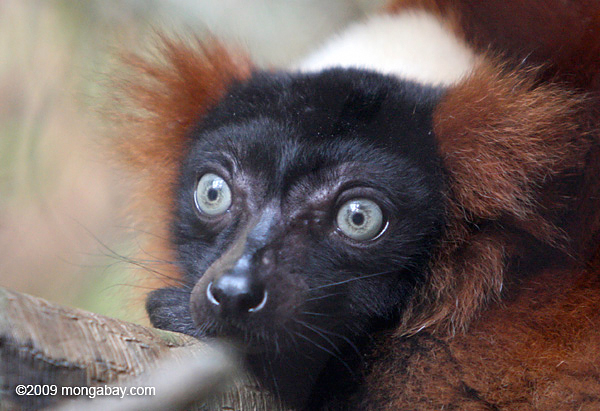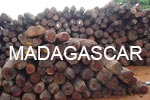
Red ruffed lemur from the Masoala Peninsula. This endangered red ruffed lemur is endemic to Masoala, where much of the current rosewood logging in Madagascar is occurring. The more widespread species of ruffed lemur is black-and-white. Photo taken by Rhett A. Butler in 2009
Cyclone Edzani is presently on course to hit Madagascar sometime late next week. The storm could bring devastation to Madagascar, which is already reeling from an economic crisis caused by a military coup in March. Previous cyclones, which hit Madagascar every few years on average, have caused extensive damage and loss of life.
Cyclones are also linked to rosewood logging. While harvesting of precious hardwoods for export has been prohibited for a decade, an exception has been made for “fallen trees” ostensibly knocked down by powerful cyclones. However in practice, this has created a loophole for illegal logging since the government has never conducted an inventory of downed trees following a cyclone. Timber traders can easily claim the logs they’ve harvested the result of storm damage (similar approaches are also employed by loggers in the United States and elsewhere). So should Cyclone Edzani come anywhere near rainforests that contain rosewood and ebony, expect an escalation in logging. Since national parks are about the only place where these valuable trees still stand, these biological jewels will be targeted.
Rowan Moore Gerety detailed the link between rosewood logging and cyclones in an article published on mongabay.com/wildmadagascar.org last month:
In 2000, the government stopped issuing new logging permits in the northeast and banned the export of raw timber. Four years later, in an episode that demonstrates timber traders’ ability to control the political and economic context in which they operate, an exception was made for trees that had fallen during the passage of Cyclone Gafilo.
Foresters like Sylvain Velomera, former director of Marojejy National Park, are skeptical that cyclones damage rosewood and ebony trees at all: “it’s only a justification to allow cutting of rosewood, since cyclones do not blow over rosewood, only papaya and coconut and other small vulnerable trees.” Furthermore, when the government lifted the export ban after the cyclone, it did so without prior assessment of cyclone-damaged trees or of existing lumber inventories. As a result, the orders restricting logging to fallen trees were more or less meaningless. In fact, they provided good cover for extensive logging inside national parks.
Loggers further capitalized on government leniency by using authorization forms with “titles not found in any legal text,” the EIA/GW report says, namely, “permis de ramassage,” and “permis de carbonisation” (‘collection permit’ and ‘carbonization permit,’ respectively): While these forms may have been issued by different agencies of the Malagasy government, they are not supported by Malagasy law. In the aftermath of Cyclone Gafilo, as timber traders exported large quantities of officially recognized “damaged wood,” they replenished existing stock with illicit lumber from their subcollectors. As a general rule, the EIA’s Andrea Johnson told me, logging activities in SAVA are poorly documented–logging camps, logs, and stumps, are all unmarked and unnumbered, making it nearly impossible ascertain the origin and legality of particular “bola-bolas” (logs) once several streams of wood have mingled with standing inventory in the same supply chain. It is standard practice for timber traders in the northeast to over-report cyclone damage and existing inventory, and to neglect to mark logs or properly document their logging operations, all of which has enabled them to harvest and export wood from the national parks under the guise of legality.
Related articles
Facing cash crunch, will Madagascar’s politicians sanction rainforest plunder?

(01/07/2010) Facing a severe cash crunch in the aftermath of a March military coup which triggered donor governments to suspend aid and crippled its economy, Madagascar’s top politicians are reportedly mulling the export of tens of millions of dollars’ worth of precious hardwoods illegally logged from the country’s rainforest parks, according to high-placed sources in the Indian Ocean island nation.
Madagascar’s Political Chaos Threatens Conservation Gains [Yale e360]

(01/04/2010) Only ten years ago, Madagascar was notorious for its environmental degradation and deforestation; astronauts orbiting the earth remarked that the red color of Madagascar’s rivers suggested the country was bleeding to death as its denuded mountainsides hemorrhaged topsoil into its waterways. But that began to change earlier this decade when President Mark Ravalomanana, working with international conservation organizations and local groups, set aside 10 percent of the country as parks and nurtured a thriving ecotourism business, all of which slowed deforestation and safeguarded more of the nation’s legendary biodiversity. The emergence of ecotourism helped make local people partners — rather than adversaries — in conservation. In short order, Madagascar went from being a pariah of the conservation world to a model. All of which makes the spasm of forest destruction that has swept the country since a coup last March even more tragic. In the absence of governance, organized gangs ransacked the island’s protected rainforests for biological treasures — including precious hardwoods and endangered lemurs — and frightened away tourists, who provide a critical economic incentive for conservation.
(12/17/2009) Delmas, a subsidiary of French shipping giant CMA-CGM, is facilitating the destruction of Madagascar’s endangered rainforests by providing transport for timber illegally logged from the country’s national parks, report multiple sources that have been investigating the illegal rosewood trade in the Indian Ocean island nation. The accusations put Delmas directly in conflict with the French government’s push at climate talks in Copenhagen to establish stronger safeguards against illegal logging.

(12/16/2009) In the midst of cyclone season, a ‘dead’ period for tourism to Madagascar’s east coast, Vohémar, a sleepy town dominated by the vanilla trade, is abuzz. Vanilla prices have scarcely been lower, but the hotels are full and the port is busy. “This afternoon, it was like a 4 wheel drive show in front of the Direction Regionale des Eaux & Forets,” one source wrote in an email on November 29th: “Many new 4×4, latest model, new plane at the airport, Chinese everywhere.”